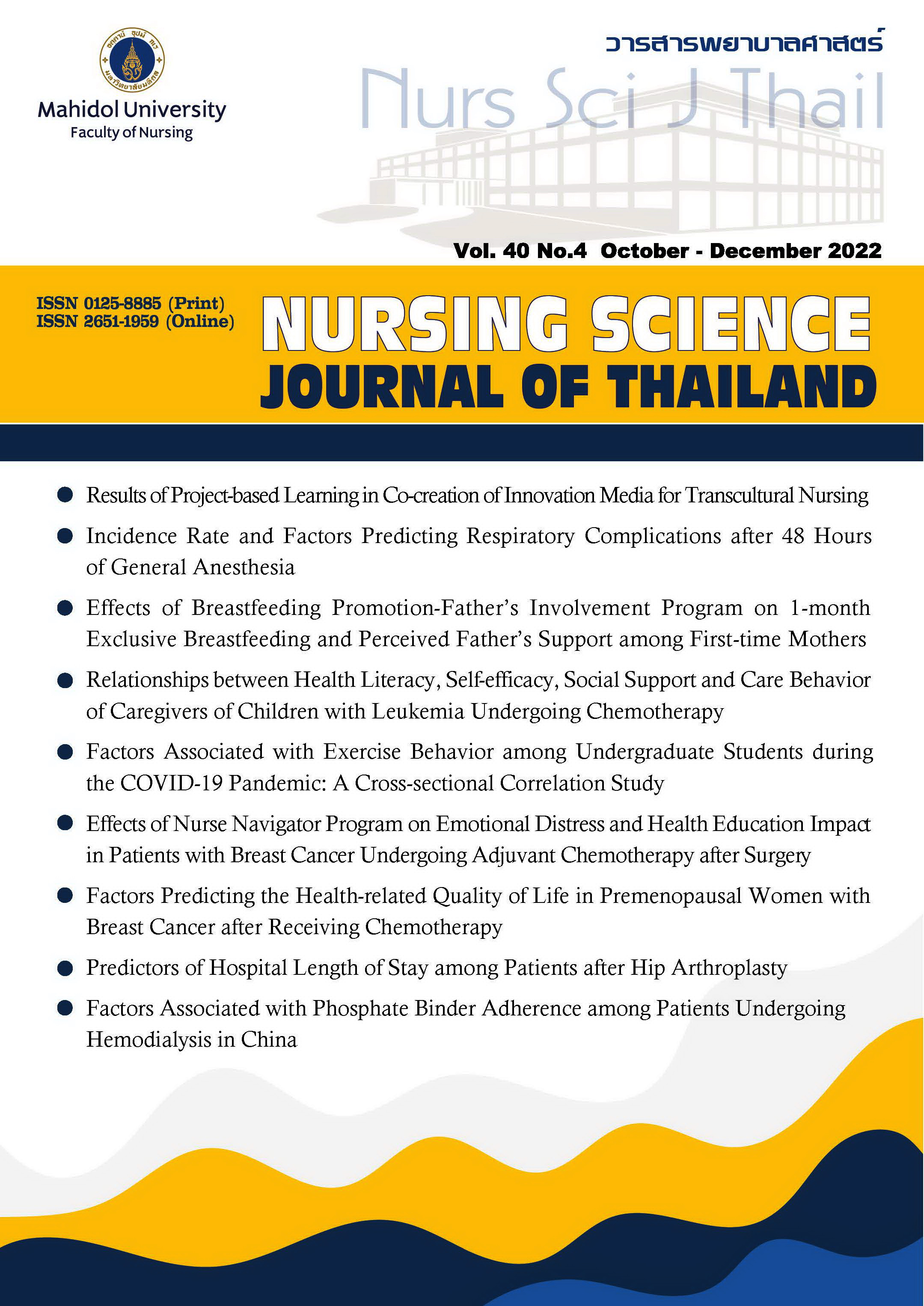ผลของโปรแกรมพยาบาลเนวิเกเตอร์ต่อความตึงเครียดทางอารมณ์ และผลกระทบจากการได้รับความรู้เกี่ยวกับสุขภาพในผู้ป่วยมะเร็งเต้านมที่ได้รับเคมีบำบัดหลังการผ่าตัด
Main Article Content
บทคัดย่อ
วัตถุประสงค์: เพื่อศึกษาผลของโปรแกรมพยาบาลเนวิเกเตอร์กับการดูแลตามปกติต่อความตึงเครียดทางอารมณ์ และผลกระทบจากการได้รับความรู้เกี่ยวกับสุขภาพในผู้ป่วยมะเร็งเต้านมที่ได้รับการรักษาเสริมด้วยยาเคมีบำบัดภายหลังการผ่าตัด
รูปแบบการวิจัย: การทดลองแบบสุ่มที่มีการควบคุม
วิธีดำเนินการวิจัย: กลุ่มตัวอย่างเป็นผู้ป่วยหลังผ่าตัดมะเร็งเต้านมในระยะที่ I-II ที่มาติดตามการรักษาครั้งแรก และมีแผนการรักษาเสริมด้วยยาเคมีบำบัดจำนวน 60 รายแบ่งเป็นกลุ่มควบคุม 29 ราย กลุ่มทดลอง 31 ราย โดยการสุ่มกลุ่มตัวอย่างด้วยการใช้โปรแกรมคอมพิวเตอร์ กลุ่มควบคุมได้รับการพยาบาลตามปกติ กลุ่มทดลองได้รับโปรแกรมพยาบาลเนวิเกเตอร์ตามรูปแบบ patient navigation model ซึ่งเน้นผู้ป่วยเป็นศูนย์กลางที่ออกแบบมาเพื่อปรับปรุงประสบการณ์และการส่งมอบการรักษาด้านมะเร็งแก่ผู้ป่วยโดยการขจัดอุปสรรคในการดูแล รวบรวมข้อมูลโดยใช้แบบประเมินสภาพอารมณ์ และแบบสอบถามผลกระทบจากการได้รับความรู้เกี่ยวกับสุขภาพ วิเคราะห์ข้อมูลโดยใช้สถิติการวิเคราะห์ความแปรปรวนพหุคูณ (MANOVA)
ผลการวิจัย: ผู้ป่วยมะเร็งเต้านมที่ได้รับการรักษาเสริมด้วยยาเคมีบำบัดภายหลังการผ่าตัดที่ได้รับโปรแกรมพยาบาลเนวิเกเตอร์มีผลรวมคะแนนเฉลี่ยของความตึงเครียดทางอารมณ์น้อยกว่าผู้ป่วยที่ได้รับการพยาบาลตามปกติอย่างมีนัยสำคัญทางสถิติ (p = .031) แต่อย่างไรก็ดี คะแนนเฉลี่ยผลกระทบจากการได้รับความรู้เกี่ยวกับสุขภาพของผู้ป่วยทั้งสองกลุ่มไม่พบความแตกต่างกันอย่างมีนัยสำคัญทางสถิติ (p = .856)
สรุปและข้อเสนอแนะ: โปรแกรมพยาบาลเนวิเกเตอร์ในผู้ป่วยมะเร็งเต้านมที่ได้รับการรักษาเสริมด้วยยาเคมีบำบัดภายหลังการผ่าตัด ช่วยทำให้ผู้ป่วยมีความความตึงเครียดทางอารมณ์น้อยลงได้ พยาบาลสามารถนำโปรแกรมพยาบาลเนวิเกเตอร์นี้ไปประยุกต์ใช้ในการดูแลผู้ป่วยมะเร็งเต้านม
Article Details

อนุญาตภายใต้เงื่อนไข Creative Commons Attribution-NonCommercial-NoDerivatives 4.0 International License.
ลิขสิทธิ์: วารสารพยาบาลศาสตร์เป็นเจ้าของลิขสิทธิ์ในการเผยแพร่ผลงานที่ตีพิมพ์ ห้ามผู้ใดนำบทความที่ได้รับการตีพิมพ์ในวารสารพยาบาลศาสตร์ไปเผยแพร่ในลักษณะต่างๆ ดังต่อไปนี้ การส่งบทความไปตีพิมพ์เผยแพร่ที่อื่น การนำบทความเผยแพร่ออนไลน์ การถ่ายเอกสารบทความเพื่อกิจกรรมที่ไม่ใช่การเรียนการสอน ยกเว้นเสียแต่ได้รับอนุญาตจากวารสารพยาบาลศาสตร์

Disclaimer: เนื้อหาบทความหรือข้อคิดเห็นใดๆ ในวารสารพยาบาลศาสตร์ ถือเป็นความรับผิดชอบของผู้เขียน กองบรรณาธิการไม่จำเป็นต้องเห็นด้วยและไม่มีส่วนรับผิดชอบแต่อย่างใด
เอกสารอ้างอิง
World Health Organization. GLOBOCAN 2020: new global cancer data [Internet]. Lyon: International Agency for Research on Cancer; 2020 [cited 2020 Nov 29] Available from: https://www.uicc.org/news/globocan-2020-new-global-cancer-data.
Xu S, Liu Y, Zhang T, Zheng J, Lin W, Cai J, et al. The global, regional, and national burden and trends of breast cancer from 1990 to 2019: results from the global burden of disease study 2019. Front Oncol. 2021;11:689562. doi: 10.3389/fonc.2021.689562.
National Cancer Institute, Department of Medical Services, Ministry of Public Health. Hospital-based cancer registry 2019. Bangkok: New Thammada Press; 2020 [cited 2020 Nov 29]. Available from: http://www.nci.go.th/th/File_download/Nci%20Cancer%20Registry/Hospital-Based%202019%20NCI.pdf. (in Thai).
Goldhirsch A, Winer EP, Coates A, Gelber R, Piccart-Gebhart M, Thürlimann B, et al. Personalizing the treatment of women with early breast cancer: highlights of the St Gallen International Expert Consensus on the Primary Therapy of Early Breast Cancer 2013. Ann Oncol. 2013;24(9):2206-23. doi: 10.1093/annonc/mdt303.
Downing A, Twelves C, Forman D, Lawrence G, Gilthorpe MS. Time to begin adjuvant chemotherapy and survival in breast cancer patients: a retrospective observational study using latent class analysis. Breast J. 2014;20(1):29-36. doi: 10.1111/tbj.12209.
Sheppard VB, Isaacs C, Luta G, Willey SC, Boisvert M, Harper FWK, et al. Narrowing racial gaps in breast cancer chemotherapy initiation: the role of the patient–provider relationship. Breast Cancer Res Treat. 2013;139(1):207-16. doi: 10.1007/s10549-013-2520-3.
Freeman HP. The origin, evolution, and principles of patient navigation. Cancer Epidemiol Biomarkers Prev. 2012;21(10):1614-7. doi: 10.1158/1055-9965.EPI-12-0982.
Nizamli F, Anoosheh M, Mohammadi E. Experiences of Syrian women with breast cancer regarding chemotherapy: a qualitative study. Nurs Health Sci. 2011;13(4):481-7. doi: 10.1111/j.1442-2018.2011.00644.x.
Saedi HS, Pour MK, Sabahi E, Shahidsales S. Assessment of the psychological distress difficulties in patients with cancer using the national comprehensive cancer network rapid screening measure. The Chinese-German Journal of Clinical Oncology. 2012;11(8):472-7. doi: 10.1007/s10330-012-1020-y.
Matsuda A, Yamaoka K, Tango T, Matsuda T, Nishimoto H. Effectiveness of psychoeducational support on quality of life in early-stage breast cancer patients: a systematic review and meta-analysis of randomized controlled trials. Qual Life Res. 2014;23(1):21-30. doi: 10.1007/s11136-013-0460-3.
Harder H, Ballinger R, Langridge C, Ring A, Fallowfield LJ. Adjuvant chemotherapy in elderly women with breast cancer: patients' perspectives on information giving and decision making. Psychooncology. 2013;22(12):2729-35. doi: 10.1002/pon.3338.
Lekdamrongkul P, Pongthavornkamol K, Chompoobubpa T, Siritanaratkul N. Relationships among information needs, information received, self-care behaviors and quality of life in hematologic cancer patients receiving chemotherapy. Nursing Science Journal of Thailand. 2012;30(3):64-73. (in Thai).
Liao M-N, Chen S-C, Lin Y-C, Chen M-F, Wang C-H, Jane S-W. Education and psychological support meet the supportive care needs of Taiwanese women three months after surgery for newly diagnosed breast cancer: a non-randomised quasi-experimental study. Int J Nurs Stud. 2014;51(3):390-9. doi: 10.1016/j.ijnurstu.2013.07.007.
Jordan JE, Haynes K, Livingston JA, Osborne RH. Comparison of the pre–post and transition question assessments in a health education setting. J Clin Epidemiol. 2009;62(6):642-9. doi: 10.1016/j.jclinepi.2008.07.019.
Osborne RH, Elsworth GR, Whitfield K. The Health Education Impact Questionnaire (heiQ): an outcomes and evaluation measure for patient education and self-management interventions for people with chronic conditions. Patient Educ Couns. 2007;66(2):192-201. doi: 10.1016/j.pec.2006.12.002.
Phuengphasook S, Wanitkun N, Towsakulkao T, Utriyaprasit K. Health literacy, health education outcomes and social influence, and their relationships with type-2 diabetes and/or hypertension patients’ clinical outcomes. Thai Journal of Nursing Council. 2017;32(2):111-25. (in Thai).
Freund KM, Battaglia TA, Calhoun E, Dudley DJ, Fiscella K, Paskett E, et al. National cancer institute patient navigation research program: methods, protocol, and measures. Cancer. 2008;113(12):3391-9. doi: 10.1002/cncr.23960.
Burhansstipanov L, Dignan M, Schumacher A, Krebs L, Alfonsi G, Apodaca C. Breast screening navigator programs within three settings that assist underserved women. J Cancer Educ. 2010;25(2):247-52. doi: 10.1007/s13187-010-0071-4.
Fillion L, de Serres M, Cook S, Goupil RL, Bairati I, Doll R. Professional patient navigation in head and neck cancer. Semin Oncol Nurs. 2009;25(3):212-21. doi: 10.1016/j.soncn.2009.05.004.
Madore S, Kilbourn K, Valverde P, Borrayo E, Raich P. Feasibility of a psychosocial and patient navigation intervention to improve access to treatment among underserved breast cancer patients. Supportive Care Cancer. 2014;22(8):2085-93. doi: 10.1007/s00520-014-2176-5.
Gabitova G, Burke NJ. Improving healthcare empowerment through breast cancer patient navigation: a mixed methods evaluation in a safety-net setting. BMC Health Serv Res. 2014;14:407. doi: 10.1186/1472-6963-14-407.
Cohen J. Statistical power analysis for the behavioral sciences. 2nd ed. Hillsdale, NJ: Lawrence Erlbaum Associates; 1988. 567 p.
McNair DM, Lorr M, Droppleman LF. Manual for the profile of mood states. San Diego, CA: Educational and Industrial Testing Service; 1971. 27 p.
Yongthong N, Wattanapailin A, Seeherunwong A, Yuttatri P. The effect of a coping enhancing program on depression in breast cancer patients. Nursing Science Journal of Thailand. 2013;31(3):27-36. (in Thai).
Ramirez AG, Muñoz E, Parma DL, Perez A, Santillan A. Quality of life outcomes from a randomized controlled trial of patient navigation in Latina breast cancer survivors. Cancer Med. 2020;9(21):7837-48. doi: 10.1002/cam4.3272.


